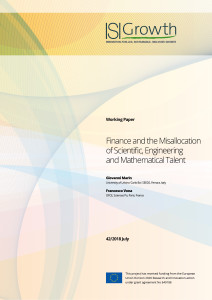The US financial sector has become a magnet for the brightest graduates in the science, technology, engineering and mathematical fields (STEM). We provide quantitative bases for this well-known fact and illustrate its consequences for the productivity growth in other sectors over the period 1980-2014. First, we find that the share of STEM talents grew significantly faster in finance than in other key STEM sectors such as high-tech, and this divergent pattern has been more evident for STEM than for general skills and more pronounced for investment banking. Second, this trend did not reverse after the Great Recession, and a persistent wage premium is found for STEM graduates working in finance and especially in typical financial jobs at the top of the wage distribution. Third, the brain drain of STEM talents into finance has been associated with a cumulative loss of labor productivity growth of 6.6% in the manufacturing sectors. Our results suggest that increasing the number of STEM graduates may not be enough to reignite sluggish economic growth without making their employment in finance more costly.
Finance and the Misallocation of Scientific, Engineering and Mathematical Talent
Giovanni Marin
University of Urbino ‘Carlo Bo’; SEEDS, Ferrara, Italy
OFCE, Sciences Po, Paris, France

